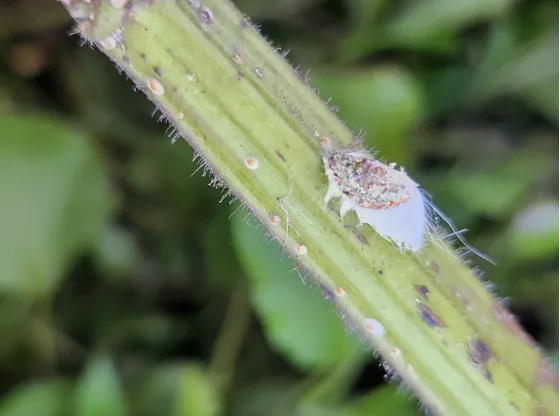By Robin Harper
Recently, a client sent this question to the Help Desk, “I was pruning my Salvia bush last week and came upon these pests. I have scoured the IPM site and my pest management books and cannot find what this is or how to treat it. The bush is at least eight years old and has done very well in the past years.”
“Thank you for contacting the UC Master Gardener Help Desk with your question about insects on your salvia and for sending a photo. Photos always make it easier to identify a problem,” Robin Harper replied.

Natural predators usually manage the Cottony cushion scale, including the Vedalia beetle (a type of ladybug) and a tiny parasitic fly called Cryptochaetum. These natural predators can be the only management you need unless they are disrupted by the ants protecting their honeydew source. You can take a two-pronged approach and protect the natural predators by controlling the ants, along with using a horticultural oil to smother the juveniles. Avoid using broad-spectrum insecticides, which are very harmful to natural predators.
Details of the lifecycle and how to manage the insects on your salvia are provided on the UC IPM website at https://ipm.ucanr.edu/PMG/PESTNOTES/pn7410.html. Note that this article gives information on recognizing if the two key natural predators are present on your plant. You can also read up on controlling ants in your garden at http://ipm.ucanr.edu/PMG/PESTNOTES/pn7411.html and more about Vedalia beetles at https://ipm.ucanr.edu/natural-enemies/vedalia/.

